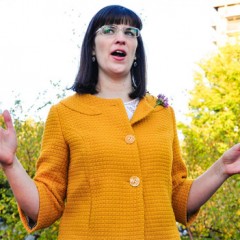
(RNS) The Mormon Church insists that excommunication threats targeting activists Kate Kelly and John Dehlin were generated by their respective LDS leaders in Virginia and northern Utah.
Others see the timing as evidence that the two disciplinary hearings are being coordinated from the faith’s Salt Lake City headquarters.
But this much is certain: If Mormon higher-ups want these actions to stop, they could do so.
They have done so before. The Church of Jesus Christ of Latter-day Saint’s authorities — presumably then-President Gordon B. Hinckley — stepped in to halt church disciplinary hearings in several high-profile cases of writers and scholars in the mid- to late 1990s, according to Mormon sociologist Armand Mauss.
Elbert Peck, former editor of Sunstone, a magazine for Mormon intellectuals, faced possible church sanction for providing a forum on controversial LDS topics. He was told that Hinckley had the hearing canceled.
“There is a chance they would call off these, too,” Mauss said Tuesday (June 17) from Irvine, Calif. “Or they could limit the outcome to disfellowshipment rather than excommunication.”
- READ: The ‘Splainer: Excommunication 101 (RNS)
If Kelly and Dehlin are disfellowshipped (a less-severe punishment), for instance, they would no longer be able to take the sacrament (communion), speak in church, hold a position or attend LDS temples.
That’s not too dissimilar from the conditions Kelly’s regional president already imposed on her May 5 as part of an “informal probation” before she moved from Virginia to Utah last month.
But Kelly and Dehlin still would be considered members of The Church of Jesus Christ of Latter-day Saints.
If they were excommunicated, their memberships would be nullified. They still could attend services in their congregations, but would have to be rebaptized to rejoin the faith.
“Mormon leaders are attempting to draw a line between public commentary and even criticism on the part of church members, on the one hand,” Mauss said, “and organizing a pressure group, on the other hand.
“It seems clear to me that Kate crossed this line,” the sociologist said, “but a verdict of excommunication would be a harsher outcome than is necessary or useful in this case.”
Kelly is the founder of Ordain Women, which has been asking the LDS prophet to seek divine approval of female admittance into the faith’s all-male priesthood.
Philip Barlow, head of Mormon history and culture at Utah State University, characterizes the relationship between LDS authorities and local lay leaders as a kind of counseling.
“It is my impression from previous cases that the church is sincere when it says these decisions are adjudicated by local authorities,” Barlow said, “but (higher) authorities can certainly counsel with local leaders to remind them of principles and concerns.”
Local Mormon leaders might initiate a disciplinary council, he said, “when the good name of the church needs protecting.”
That can happen “if a member goes over some line that authorities construe as dangerous,” Barlow said, “but the good name of church can also be sullied if it’s wrongly perceived as disallowing honest questions or free thought.”
Sometimes, he said, it’s all a question of tone.
That was the argument LDS spokeswoman Ally Isom offered Tuesday (June 17) in an hourlong interview with Doug Fabrizio on KUER’s “Radio West.”
The conversation about ordaining women “is not the problem,” Isom said. “It is not what is being said — it is how it is being said that becomes problematic.”
Though declining to speak specifically about Kelly’s case, Isom did say conversations about women’s ordination to the priesthood are taking place everywhere, including in the church’s weekly women’s Relief Society meetings.
Isom said she was “not saying there is no information provided from church headquarters” to lay bishops and stake presidents across the globe. But that comes more in the form of “standard leadership training,” she said, including “how to conduct their stewardship. It is more of a technical direction and guidance.”
Kelly believes it is her right to choose how she wants to approach her bishop’s council set for Sunday and has decided not to travel 2,000 miles to make her case in person.
“My bishop told me in his letter that I could engage by written record,” she said Tuesday, “and that he considered that to be a legitimate way.”
The human-rights attorney, who is living with her parents in Provo until she moves to Kenya with her husband, repeatedly suggested discussing her Ordain Women efforts with her Virginia bishop, Mark Harrison, but “he never took me up on it.”
Kelly said. “It’s not about listening to me or hearing what I have to say. Otherwise he would have asked me while he was in the same neighborhood.”
Kelly has written a long brief in her defense and has invited others to testify about how the drive toward female ordination has helped them stay in the Utah-based faith.
More than 800 people already have.
Plus, there are more than 50 vigils planned in 17 countries during her disciplinary hearing.
LDS leaders “are claiming that I am recruiting people,” Kelly said. “An important part of the record is to show that is not the case; this is engaging them in the gospel, bringing them back to the church.”
It is “vital,” she said, “to show that side of the story.”
(Peggy Fletcher Stack writes for The Salt Lake Tribune.)









